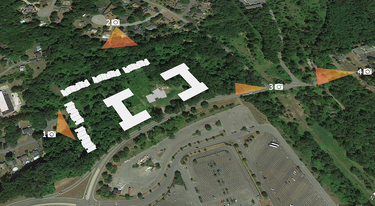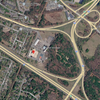Guilderland Planning Board approves amended plan for Apex at Crossgates
GUILDERLAND — The Guilderland Planning Board recently approved an amended site plan for the new owners of the proposed 222-unit development near Crossgates Mall.
The planning board on Aug. 10 approved a site plan for the United Group of Troy for 192 apartments and 30 townhomes, where the largest change compared to an early proposal from the Pyramid Companies is the shift of two five-story buildings approximately 300 feet to the north of Westmere Terrace and 150 feet from the neighborhood property line.
United will also not build 90 additional apartments that Pyramid had planned for the site at some point in the future.
Being developed under a United limited-liability company, UG Family, the 222-unit proposal is being called The Apex at Crossgates. United Group, through another one of its LLCs, bought the nearly 20-acre parcel where the project is to be built from the mall for $5.43 million in June.
The Pyramid plan received town approval in October 2020.
The new Apex at Crossgates project proposes more spacing out of the development in addition to moving the site’s mid-rise buildings farther away from the Westmere Terrace neighborhood where some residents had objected to the projects and filed an ultimately unsuccessful suit to stop it.
Save the Pine Bush, a grassroots not-for-profit advocacy group, also unsuccessfully filed suit over the project.
The new site layout shows five townhomes with six units each running along the perimeter of the parcel, with two townhomes backing onto the Westmere Terrace side of the development and the other three buildings placed across the rear of the parcel running parallel to Rapp Road. The two U-shaped apartment buildings have been pushed closer to the city of Albany side of the parcel.
Aug. 10 was the second public hearing held by the planning board on the proposal.
Saturday work
Westmere resident Iris Broyde said she felt “compelled to revisit a condition that was imposed upon Westmere Terrace as part of the 2020 [Environmental Impact Statement] approval.”
The construction hours of operation approved at that time were Monday through Friday, 7 a.m. to 5 a.m., and Saturday, 9 a.m. to 4 .m.
“The Saturday inclusion in the construction schedule was vehemently contested by Westmere Terrace residents in our meetings with Pyramid’s representative,” Broyde said. “But for Pyramid, this was abjectly non-negotiable.”
Broyde asked the planning board to prohibit work on Saturdays in part because it’s the Sabbath for the Jewish families in the Westmere neighborhood but also because there are families on Westmere Terrace whose children have disabilities, specifically autism.
“People with autism are extremely sensitive to sound and noise,” she said, and “seven hours of unceasing construction” on Saturdays would cause “duress” not only to the child but their family.
The planning board voted to allow work on Saturdays.
Traffic and water concerns
Resident Robyn Gray, who chairs the steering committee for the Guilderland Coalition for Responsible Growth, asked, “How does this meet TOD [Transit Oriented District] guidelines other than you’re putting in a couple of bus stops, and it’s next to the mall and the mall is in the TOD?”
She wondered who would be living in the apartments, noting a recent report about millennials having an average debt load of $100,000 and how those would be the same people United Group would be targeting to live in The Apex, which would bring additional issues.
“How are these kids going to afford to live in a place like this, they’re going to be doubling up with roommates,” said Gray. “When you’re doubling up with roommates, you’re talking about more vehicles.”
Gray went on to touch on issues related to traffic, multi-use trails, and greenspace, before reading a letter from Lynne Jackson of Save the Pine Bush.
After Gray spoke, the planning board’s chairman, Stephen Feeney, said, “Just a little reminder that we are here tonight to look at the amendment to the site plan for a previously approved project that went through [a] yearslong environmental review process; a DEIS [Draft Environmental Impact Statement]; an FEIS [Final EIS]; two lawsuits, I guess it survived. So you know, the traffic issues, a lot of that stuff is settled.”
Feeney said, by right, the United Group could have built the previously-approved Pyramid project and never have come back before the planning board.
He said the town worked “very hard on the traffic analysis and multiple alternatives and tried to solve a lot of issues,” but, when it came to mitigation, the town could control only what it could control. “We didn’t control property in the city,” he said.
Chuck Klaer, a former Guilderland zoning board member, wanted to know about stormwater runoff, and said that 100-year flood events were happening every 10 years now.
Feeney told him, “They’re designed to handle it. It’s designed to handle the event, Mr. Klaer.”
Feeney said the town-designated engineer did review the changes being proposed for this site in addition to analyzing United’s stormwater management plan, and said there will be approximately a quarter less acre of impervious surface with United’s proposal versus the original Pyramid plan.
TOD
After further comment was made about the transit-oriented district, Kenneth Kovalchick, the town’s planner, sought to add some background and context to the issue.
“Because I’ve been hearing — whether it was the Albany County Planning Board or comments at the July 13 meeting or this this evening — I think there’s a misunderstanding from a lot of people what a TOD is,” he said.
Kovalchick said the standard process for planning any transit-oriented district is that “you want to build high density around a mass-transit facility,” which could be a rail or bus station.
In the case of The Apex at Crossgates, it’s the terminus of the CDTA’s Purple bus line, he said.
The standard in TOD planning is to build the high-density housing within a 10-minute walk or half-mile distance of the mass-transit facility, Kovalchick said, and encourage mixed uses within that high density area.
“Now, that’s not to mean that you have to have mixed uses on every development within that TOD district,” he said. “The goal is to have mixed uses within the TOD district, not site specific.”
Kovalchick went on to explain how the three sites — Apex at Crossgates; a future Costco Wholesale store; and a mix-use development, which has not been proposed — previously-owned by Pyramid collectively had characteristics that fit with the TOD.



